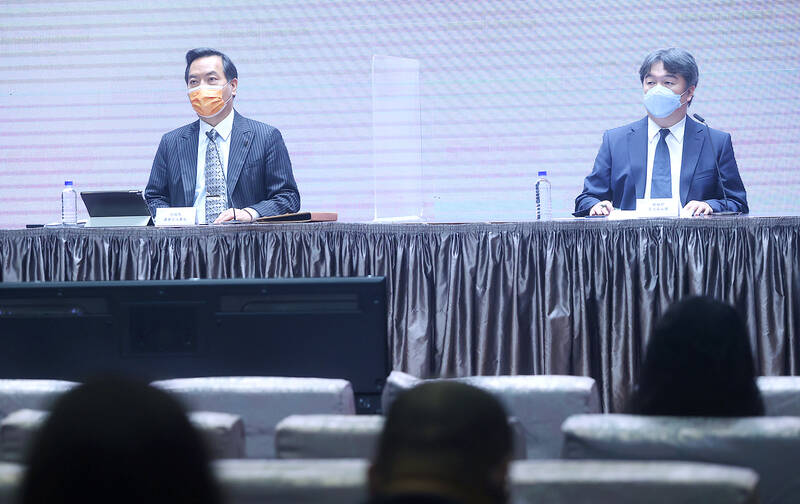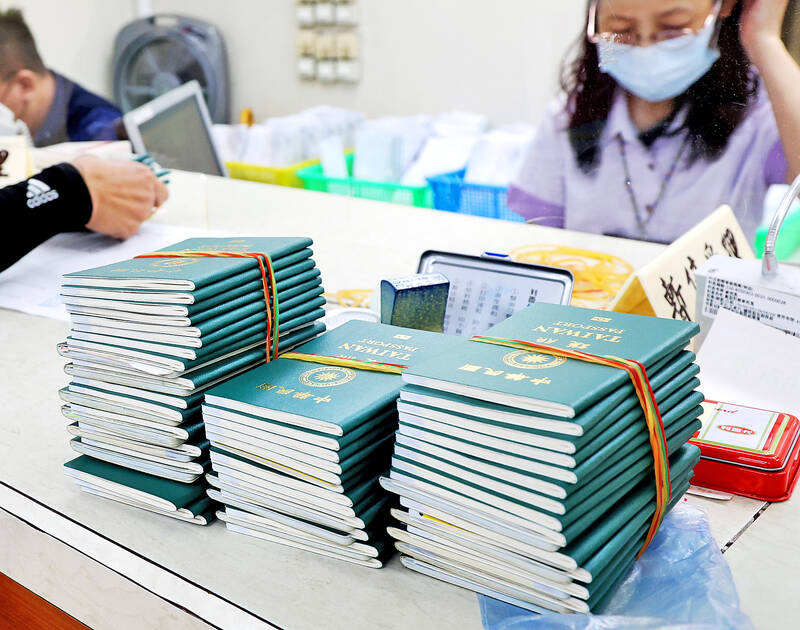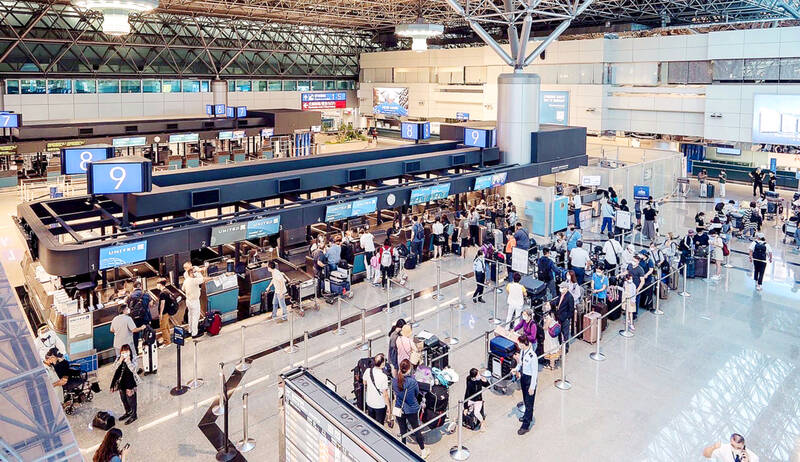Travelers arriving in Taiwan from Oct. 13 would no longer be required to quarantine on arrival and visitors of all nationalities would be allowed to enter, Premier Su Tseng-chang (蘇貞昌) announced yesterday.
However, the number of arrivals would be capped at 150,000 per week, he added.
Travelers aged two or older would be given four rapid antigen COVID-19 test kits on arrival and be asked to monitor their health for seven days, Cabinet spokesman Lo Ping-cheng (羅秉成) told a news conference.

Photo: CNA
Under the new arrival protocol, travelers would have to take a test on the day of arrival or the day after, followed by tests every two days during the seven-day period, Lo cited Su as telling a Cabinet meeting.
However, they would be allowed to go outside, he said.
If a visitor staying in a hotel tests positive during the seven-day period, they would have to relocate to a government-run quarantine center or a designated quarantine hotel, Lo said.

Photo: CNA
A ban on incoming and outgoing tour groups organized by travel agencies, which was imposed in March 2020, would also be lifted, the government said.
The decision to end the mandatory three-day quarantine for arrivals was made at yesterday’s Cabinet meeting, after Su visited Taiwan Taoyuan International Airport the previous day to inspect its readiness for the border opening, Lo said.
While the borders would reopen to all visitors, the number of arrivals would still be capped, as part of Taiwan’s COVID-19 control efforts, Lo said.

Photo courtesy of Taiwan Taoyuan International Airport via CNA
Ahead of the full opening, Taiwan yesterday raised the cap to 60,000 from 50,000 and eased some entry regulations.
Travelers are no longer required to take a polymerase chain reaction test on arrival, the Central Epidemic Command Center (CECC) said.
Arrivals can now quarantine at home even if they share it with others, as long as they stay in a separate room with an en suite bathroom, the center said.
From yesterday, travelers eligible for visa-free entry are allowed to enter, it said.
However, international arrivals before Oct. 13 would not be allowed to take the MRT from Taoyuan airport, but buses and fixed-price taxi services to destinations across Taiwan would remain available, the center said.
Free COVID-19 prevention buses run from the airport to Taichung, Yunlin County, Chiayi City, Chiayi County, Tainan, Kaohsiung, Pingtung County, New Taipei City and Taipei, as well as seven quarantine hotels in or near Taoyuan, it added.
Travelers may also be picked up by family members or friends at gates 11 through 15 at Terminal 1 and gates 31 through 33 at Terminal 2, the CECC said.
People traveling in groups, including students, business travelers and employees (including migrant workers), may arrange a vehicle to pick them up, it said.
People who parked their vehicle in designated airport lots before traveling abroad may drive to their quarantine location, it added.

SECURITY: As China is ‘reshaping’ Hong Kong’s population, Taiwan must raise the eligibility threshold for applications from Hong Kongers, Chiu Chui-cheng said When Hong Kong and Macau citizens apply for residency in Taiwan, it would be under a new category that includes a “national security observation period,” Mainland Affairs Council (MAC) Minister Chiu Chui-cheng (邱垂正) said yesterday. President William Lai (賴清德) on March 13 announced 17 strategies to counter China’s aggression toward Taiwan, including incorporating national security considerations into the review process for residency applications from Hong Kong and Macau citizens. The situation in Hong Kong is constantly changing, Chiu said to media yesterday on the sidelines of the Taipei Technology Run hosted by the Taipei Neihu Technology Park Development Association. With

CARROT AND STICK: While unrelenting in its military threats, China attracted nearly 40,000 Taiwanese to over 400 business events last year Nearly 40,000 Taiwanese last year joined industry events in China, such as conferences and trade fairs, supported by the Chinese government, a study showed yesterday, as Beijing ramps up a charm offensive toward Taipei alongside military pressure. China has long taken a carrot-and-stick approach to Taiwan, threatening it with the prospect of military action while reaching out to those it believes are amenable to Beijing’s point of view. Taiwanese security officials are wary of what they see as Beijing’s influence campaigns to sway public opinion after Taipei and Beijing gradually resumed travel links halted by the COVID-19 pandemic, but the scale of

A US Marine Corps regiment equipped with Naval Strike Missiles (NSM) is set to participate in the upcoming Balikatan 25 exercise in the Luzon Strait, marking the system’s first-ever deployment in the Philippines. US and Philippine officials have separately confirmed that the Navy Marine Expeditionary Ship Interdiction System (NMESIS) — the mobile launch platform for the Naval Strike Missile — would take part in the joint exercise. The missiles are being deployed to “a strategic first island chain chokepoint” in the waters between Taiwan proper and the Philippines, US-based Naval News reported. “The Luzon Strait and Bashi Channel represent a critical access

Pope Francis is be laid to rest on Saturday after lying in state for three days in St Peter’s Basilica, where the faithful are expected to flock to pay their respects to history’s first Latin American pontiff. The cardinals met yesterday in the Vatican’s synod hall to chart the next steps before a conclave begins to choose Francis’ successor, as condolences poured in from around the world. According to current norms, the conclave must begin between May 5 and 10. The cardinals set the funeral for Saturday at 10am in St Peter’s Square, to be celebrated by the dean of the College